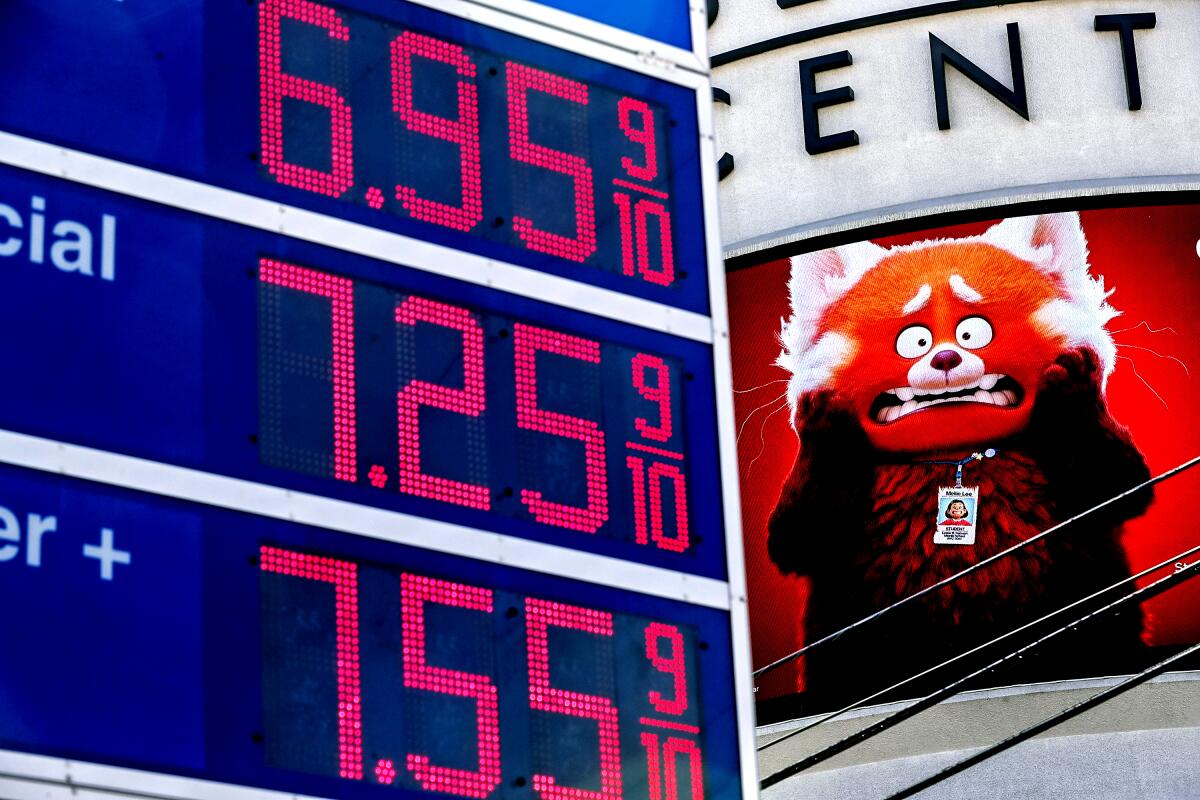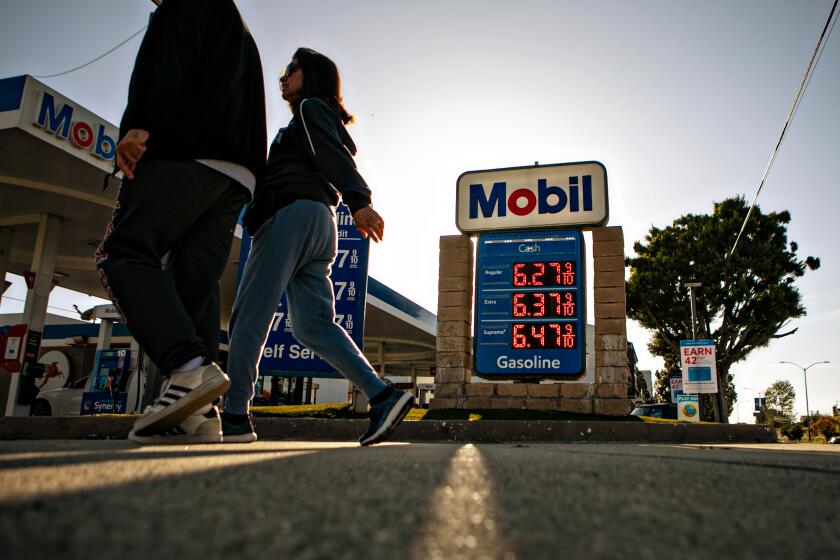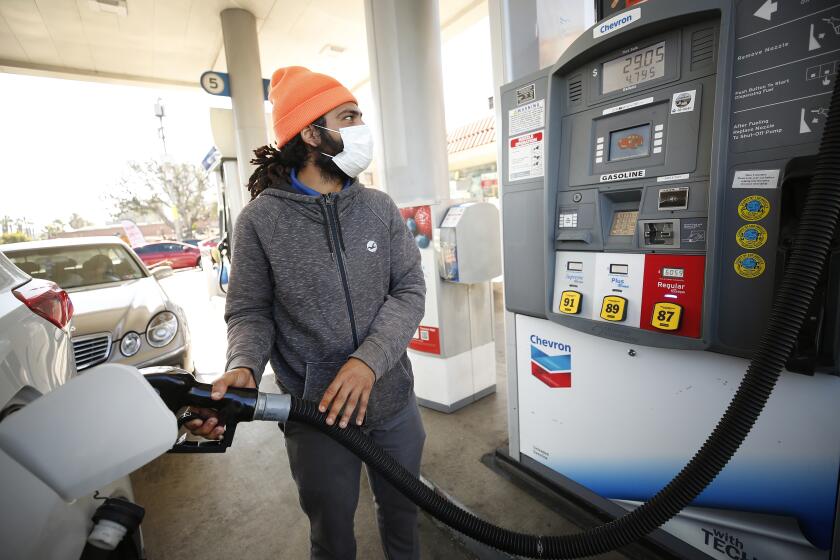Average L.A. County gas tops $6 a gallon even as prices keep falling nationwide

- Share via
While prices declined nationwide, the pain at the pump intensified this week in California as the average price of a gallon of regular-grade gasoline in Los Angeles County exceeded $6.
Experts attributed the rise in local prices to recent trouble at a handful of California oil refineries. PBF Energy refineries in Torrance and Martinez as well as a Valero refinery in Benicia outside San Francisco have experienced problems in recent weeks that caused a hit to gasoline production, driving prices up, said Patrick De Haan, head analyst at GasBuddy.
The PBF Energy Torrance refinery in particular is a crucial source of gas for Southern California. A power outage on March 6 led to a key unit going offline, with no update on when it will restart, said Marie Montgomery from the American Automobile Assn.
These refineries have undergone “flaring,” a burning off of gases that have to be released when a problem causes the refinery to go into safety mode, De Haan said. This could be due to a computer or valve issue, but refineries generally do not disclose details.
It can generally take two to four weeks for a refinery to return to full capacity, according to De Haan. The decrease in California’s gas supply can have a ripple effect up the West Coast, potentially affecting gas prices in Oregon and Washington as well.
The latest milestone caps months of rapidly rising gas costs — made worse by the war in Ukraine — that have hit consumers hard.
A set of early numbers have indicated a slight decrease in demand for gasoline on the West Coast while demand has increased in every other region across the country, De Haan said. This could suggest “demand destruction,” a phenomenon that occurs when prices are so high that Americans start to modify their behavior, he said.
In L.A., the average cost of $6.01 per gallon topped California’s average of $5.86 and the nationwide average of $4.24, according to the AAA. L.A. County average gas prices topped $5 per gallon for the first time less than a month ago — on March 3.
Neighboring Southern California counties aren’t far behind Los Angeles, with the average price of a gallon of regular-grade gas in Orange County at $5.97, in Ventura County at $5.95, in San Bernardino County at $5.90 and in Riverside County at $5.88.
State lawmakers are trying to create a rebate to every California taxpayer to help soften the blow of the recent surge in gasoline prices. Will it happen? Here’s what we know.
Across the nation, the average gas price peaked at $4.33 per gallon on March 11 and has since dropped 9 cents.
However, the national average could be artificially pulled down by states such as Maryland and Georgia that passed gas tax holidays on Friday, Haan said.
California’s Legislature was looking to temporarily suspend its gas tax — the second-highest in the nation — but Republican lawmakers did not get enough votes. Congress has also struggled to pass its own legislation suspending the federal fuel tax.
California’s Democratic lawmakers have instead pushed for a $400 gas rebate, arguing it would alleviate the burden on Californians without affecting transportation funding provided by the gas tax. On Friday, leaders of the state Senate and Assembly proposed a plan to provide broader-based refunds to address the increasing cost of all goods through $200 payments for each California taxpayer and dependent.
Meanwhile, California gas prices continue to steadily increase, and the gap between county and state prices has also widened, from 1.2% at the beginning of March to 2.6% as of Tuesday.
Gasoline prices depend on global supply and demand, which has been out of whack since the pandemic started. California drivers pay a premium for special blends.
Refinery issues aren’t the only culprit, however; other unpredictable factors such as the ongoing war in Ukraine and the global market also affect gas prices in California, De Haan said.
The cost of fuel had already been rising over the last year due to pandemic-related supply-chain issues and inflation, but gas prices have jumped to historic highs since Russia began its Feb. 24 invasion of the former Soviet republic.
California consistently has the most expensive gas in the nation due to the state’s environmental laws and its taxes on motor fuels. During warmer months, the state requires a special blend of gasoline designed to reduce air pollution that is more costly to produce.
But how high will prices go?
“It’s anybody’s guess,” Montgomery said. “If this refinery issue gets resolved quickly, then we don’t expect it to get any higher.”
Another clue is the cost of crude oil. The price per barrel peaked around $128 on March 8 and dropped below $100 a week later, but the barrel price has crept back up to $115 as of Tuesday, according to Brent crude prices.
Gas prices usually follow in the footstep of oil prices, but they don’t always move perfectly in tandem, Montgomery said.
More to Read
Sign up for Essential California
The most important California stories and recommendations in your inbox every morning.
You may occasionally receive promotional content from the Los Angeles Times.













